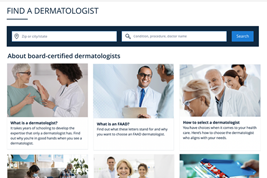Rewarding on every level
Dermatologist Anthony B. Mak, MD, PhD, FRCPC, DABD was so thankful to take part in the Resident International Grant Program and travel to Botswana to provide dermatologic care.
Dr. Mak’s story

I faced various clinical challenges, ranging from treating common dermatologic conditions with limited resources to tackling complex diseases that I had never seen before in practice. What I found most challenging was witnessing the difficulties that many patients face in regard to their social determinants of health.
Here is an example: A 40-year-old outdoor carpenter travelled many hundreds of miles to dermatology clinic for consultation. On exam he had thick, red, scaly confluent plaques covering his entire face, scalp, hands, and arms. He was clinically diagnosed with generalized hypertrophic discoid lupus erythematosus, which was associated with extensive scarring and disfigurement. I was surprised when the patient stated that his dermatologic manifestations had been present for more than 10 years and that he had not seen a medical doctor his entire adult life due to financial constraints and a lack of access of medical facilities from the remote area where he lived. Although extensive scarring and disfigurement had already occurred, he demonstrated impressive insight into his condition as being photosensitive and he adapted by constructing a face mask with materials at his disposal to prevent further exacerbation of his condition.
Prior to traveling to Botswana, my focus was on improving my clinical acumen and management in complex medical HIV dermatology and global dermatology. However, as exampled by the case above, I soon realized that I had emotionally and cognitively gained more from my patients than I had initially intended. I was impressed by their resilience, persistence, and self-advocacy in a constrained healthcare system. My lasting impression was invariably their patience, warmth, and politeness. This feeling was translated to my relationship with the clinic staff in Botswana, which allowed me to integrate smoothly as a dermatologist team member. I am grateful for the knowledge, experience, and teamwork skills that I have gained, which will undoubtedly help me provide better care to my future patients.
My time in Botswana was both intellectually and sentimentally rewarding, and I left with mixed feelings. I am appreciative that I had the opportunity to participate in a defining moment in my career; however, I am also sad that I have left behind people and places that I care about. I have traveled back to Canada with many amazing memories and hope to continue a career in global dermatology.

Dr. Mak (seated, left) with the nursing staff at Princess Marina Hospital.

Dr. Mak visited neighboring Zimbabwe.
Support International Grants
The AAD’s international grant programs help improve dermatologic care in underserved areas around the world. Learn more about this impact, and how you can get involved.
Get involved Find a Dermatologist
Find a Dermatologist
 Member directory
Member directory
 AAD Learning Center
AAD Learning Center
 2026 AAD Annual Meeting
2026 AAD Annual Meeting
 Need coding help?
Need coding help?
 Reduce burdens
Reduce burdens
 Clinical guidelines
Clinical guidelines
 Why use AAD measures?
Why use AAD measures?
 Latest news
Latest news
 New insights
New insights
 Physician wellness
Physician wellness
 Joining or selling a practice?
Joining or selling a practice?
 Promote the specialty
Promote the specialty
 Advocacy priorities
Advocacy priorities
